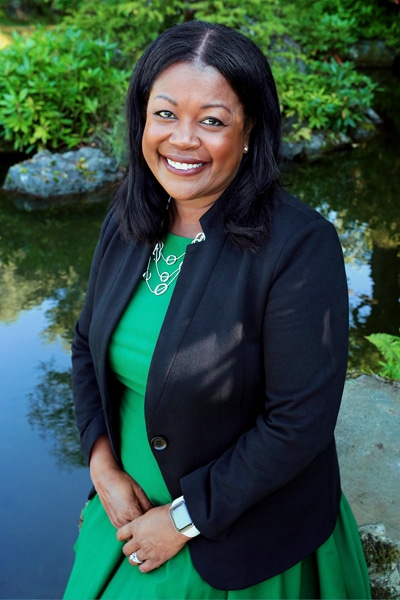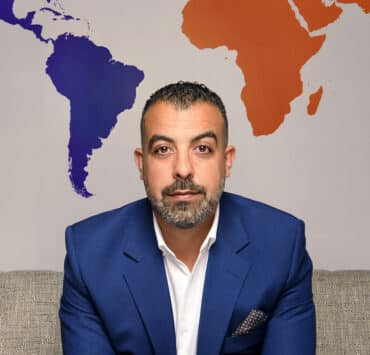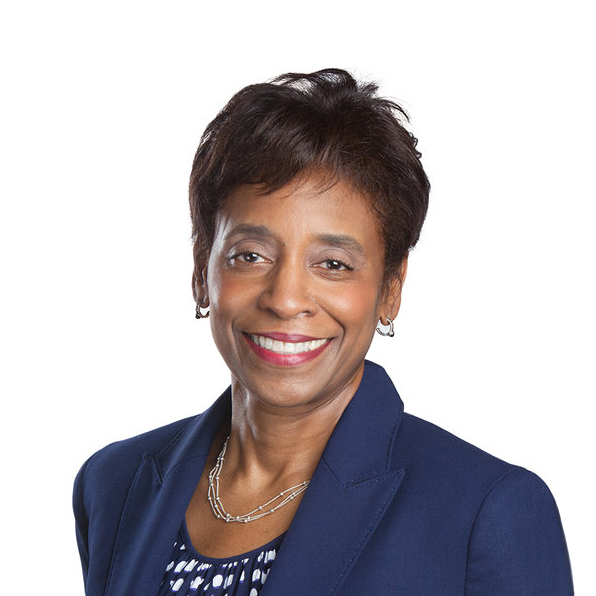|
Getting your Trinity Audio player ready...
|
Katina Thornock sought out a 1L summer internship. The first-year student at the Seattle University School of Law perused the listings, hoping to land something interesting. She read about pro bono projects, clerkship programs, public service fellowships, and judicial externships. After skipping over several typical openings, Thornock finally settled on one that seemed especially interesting—a position with a growing in-house legal team at a local coffee company.
The company—Starbucks—was closing an aggressive decade. It entered the 1990s with eighty-four locations. In 1999, when Thornock landed her internship, that number had climbed to nearly 2,500. “It was exciting to learn from a small legal department of a company in growth mode,” Thornock says.
That year, the iconic coffeehouse chain opened stories in China, Kuwait, Lebanon, and South Korea and acquired both the Tazo Tea and Hear Music brands. As part of a small legal department, Thornock made significant contributions and observed how a good in-house team helps a business meet its objectives. Although the summer went by quickly, the experience left a lasting impression on Thornock. Similarly, Thornock impressed Shelly Milano—Starbucks’ general counsel at the time—who invited her to stay on through the school year.

Thornock graduated in 2001 and started her career as a criminal prosecutor in Washington’s Pierce and King counties. She later joined the boutique firm Reed McClure, where she gained experience in medical malpractice, personal injury, and product liability. After nearly four years, a national firm came calling, and Thornock joined Cozen O’Connor as an associate attorney in the global insurance group.
While at Cozen O’Connor, Thornock continued to broaden her expertise. She added commercial and insurance coverage litigation to her growing list of legal skills and earned a spot on the annual list of Washington Rising Stars in Washington Law & Politics. That’s when Thornock received an unexpected phone call from a friend—the legal team at Starbucks was seeking to add a litigator.
Ten years after her internship, Thornock rejoined the organization as a corporate counsel, litigation. While she recognized the company’s innovative spirit and strong corporate culture, a lot had changed. By 2009, Starbucks had grown to 16,635 locations. Today, Thornock is director, managing corporate counsel of the same practice group, and the company has more than thirty thousand stores in seventy countries worldwide.
Subscribe Now
Receive stories like this one in your inbox every two weeks!
Subscribe to the free Modern Counsel newsletter.
The role is a demanding one. As the leader of the litigation team, Thornock is responsible for overseeing tort, commercial, real estate, intellectual property, discrimination, and Americans with Disabilities Act (ADA) litigation for Starbucks in North America. Additionally, she manages a team of highly skilled lawyers and paralegals that advises the business on matters related to global safety and security, risk management, store operations, store development, and supply chain operations.
Thornock can’t remember a time when she didn’t want to be a lawyer and lists Thurgood Marshall as her most impactful role model. As a young girl growing up in a family that struggled to make ends meet, she didn’t have many other options. Like Marshall, she’d have to blaze her own trail. “I saw education and the legal profession as my way out, as my way to a better future,” Thornock says. “And I knew there was a real opportunity to make a difference through law.”
If there’s one word that defines Thornock, it’s relentless. She juggled multiple jobs to pay her way through college, becoming the first person in her family to graduate. Then she traveled to Washington, DC—never having visited—to work on Capitol Hill. Next, she supported herself through law school, while also participating in the Women’s Law Caucus, Moot Court, and the Black Law Students Association.
“I saw education and the legal profession as my way out, as my way to a better future. And I knew there was a real opportunity to make a difference through law.”
The challenges she experienced solidified Thornock’s belief that lawyers can leverage their vocations to make a lasting impact, and she has found plenty of opportunities to do so at Starbucks. “We’ve tried to reframe the role of a for-profit company in the national lexicon, and we’ve shown a willingness to address social issues and challenging topics in a way many other companies haven’t,” she says.
In 2018, a Starbucks store manager sparked public outrage by refusing to let two African American men use the restroom. Starbucks CEO Kevin Johnson, General Counsel Rachel Gonzalez, and other leaders led the effort to temporarily close all domestic stores to conduct anti-bias training. The decisive response underscores the Starbucks commitment to diversity and inclusion.
The company is taking active steps to address pay equity and other cultural issues that negatively affect women and people of color. And the work is beginning to yield results. For example, in 2019, Starbucks achieved 100 percent pay equity across race and gender in similar roles in the United States.
Thornock, a passionate D&I advocate, is a past cochair of the legal department’s Diversity and Inclusion Committee. Each year, the committee assesses partner law firms’ efforts to meet certain D&I guidelines. Those who demonstrate consistent commitment and meaningful progress in certain benchmarks receive the Starbucks Excellence in Diversity & Inclusion Award. Starbucks has completed a survey of its outside firms and global legal service partners each year since 2009.
While the legal profession has made progress, it is still one of the least diverse professions in the United States. According to surveys conducted by the American Bar Association in 2017, just 35 percent of lawyers are women. In terms of ethnic diversity, Latinos and African Americans in law total just 5 percent each, while Asian Americans comprise 2 percent and Native Americans 1 percent of lawyers.
Thornock wants to see those numbers change. “Our profession needs to be more reflective of society as a whole in terms of gender and racial diversity,” she says. “We’ve made some progress, but we have a long way to go.” Starbucks is leading the way. As of June 30, 2019, 68 percent of US partners (“employees”) and 43 percent of its senior leaders are women. Beyond that, 46 percent of US partners and 15 percent of senior leaders are people of color.
“We’ve tried to reframe the role of a for-profit company in the national lexicon, and we’ve shown a willingness to address social issues and challenging topics in a way many other companies haven’t.”
“Katina is a trailblazing thought leader on issues relating to D&I,” says Bambo Obaro, a litigation partner at Weil, Gotshal & Manges. “One of the things I appreciate most about her is she walks the walk when it comes to D&I, which is essential for progress.”
For many companies, D&I stops with race and gender, but Thornock says Starbucks is taking a more holistic approach to create a “culture of belonging where everyone is welcome.” That means the company is addressing issues related to age, sexual orientation, veteran status, and disability.
Starbucks has been recognized for its commitment to hiring people with disabilities and creating accessible environments. Thornock, who has seen these issues affect family members, has served on boards of related advocacy groups and is proud to be associated with a company that is leading in all aspects of D&I.
It’s been a long time since Starbucks opened its first shop in Seattle’s historic Pike Place Market. Fifty years, to be exact. Over those five decades, the company has made good on its promise to make an impact. The company has made recent commitments to hire thousands of veterans and refugees.
Last year, The Starbucks Foundation announced $1 million in grants to foster racial equality and elevate one hundred communities in the United States. In 2019, the same organization gave $1.4 million to help underprivileged youth and students in advancing their careers and overcome the barriers they face.
Thornock knows what that’s like. She’s been there. And now, she’s helping support a company that seeks to provide opportunities that didn’t exist before.

